Military forces from Thailand, the United States and four other countries wrapped up annual Cobra Gold exercises that saw troops storm beaches, thwart biochemical attacks, launch helicopter assaults and even drink cobra blood.
Soldiers, sailors and marines from the U.S., Japan, Singapore, Indonesia and Malaysia joined their Thai counterparts in the Feb. 8-18 war games. Observers from nine other nations also attended. Most of this year’s activities were based in Chiang Mai, but marine and amphibious exercises took place, as usual, off the Sattahip coast. The U.S. Navy this year contributed 5,900 personnel.
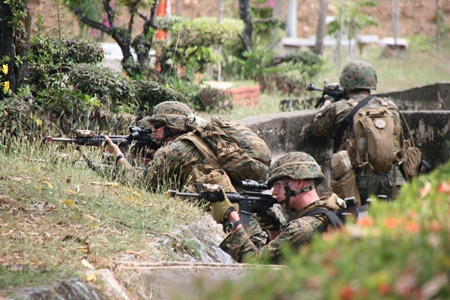 Soldiers dig in, ready for the assault at Prince Jetsada Camp in Sattahip.
Soldiers dig in, ready for the assault at Prince Jetsada Camp in Sattahip.
The showcase operations drill played out Feb. 13 at Prince Jetsada Camp in Sattahip where Thai and American helicopters led a mock amphibious assault with South Korean marines.
The Royal Thai Navy contributed the HTMS Surin and Mannok while the U.S. brought in four ships, the USS Germantown, Essex, Stockdale and Denver.
Two CH 53 Helicopters, and six CH 46 helicopters carrying 24 Thai and 92 U.S. personnel led attacks on targets to suppress the enemy before special forces from both countries rappelled down to mop up stragglers and rescue hostages. It was a quick assault meant to work equally well in wooded and mountainous areas.
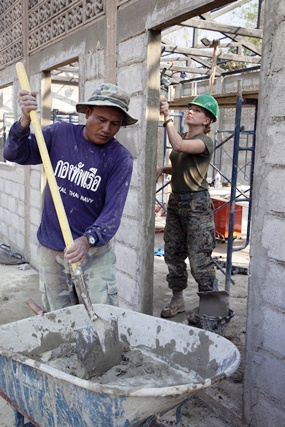 A Royal Thai Navy Marine, left, from the Royal Thai Engineer Battalion, and U.S. Marine Corps Lance Cpl. Nicolette Hawkins apply stucco to a new building at Baan Pong Wua School in Chantaburi, as part of Exercise Cobra Gold. (U.S. Marine Corps photo by Cpl. Patricia D. Lockhart/Released)
A Royal Thai Navy Marine, left, from the Royal Thai Engineer Battalion, and U.S. Marine Corps Lance Cpl. Nicolette Hawkins apply stucco to a new building at Baan Pong Wua School in Chantaburi, as part of Exercise Cobra Gold. (U.S. Marine Corps photo by Cpl. Patricia D. Lockhart/Released)
Rescue also played a role in the Feb. 12 operation, which stressed the evacuation of non-combatants in war zones. Thai Gen. Pong Sa-nganet, Japanese Ambassador Kyoji Komachi and U.S. regional security officer Randall Bennett observed as forces re-enacted the humanitarian evacuation of a disaster area.
Thai, Japanese and U.S. personnel play-acted as patients and medical personnel while forces set up an “evacuation control center,” and organized air support. The ECC focused on medical treatment, weapons and drug searches, and transportation. Each unit had to visualize a real situation and resolve the challenges faced.
Japanese commander Capt. Ucha Iamsuro said after military forces seize an area and establish a beachhead, the task is to get victims out of harm’s way by moving them via helicopter to ships offshore. By breaking the mission into parts, each group can visualize the situation better and conquer the delicate, yet complicated, logistics challenges inherent in evacuations, he said.
Planning is also at the heart of military efforts to prevent nuclear and biochemical attacks, the focus of Cobra Gold’s Feb. 15 exercise.
Royal Thai Navy and Air Force personnel joined 35 U.S. Navy sailors at the Royal Thai Fleet’s Amphibious Battalion in Plutaluang for the drill organized by the Air Force’s Research and Science Center.
Operations re-enacted the process of locating nuclear and biochemical substances in a battle situation. A Thai navy science operations team cooperated to clear out toxic substances discovered during the drill.
The benefits of joint military operations aside, officials from all sides agreed exercises like Cobra Gold help to increase cultural understanding.
That was never more apparent than on Feb. 15 when, during wilderness training, Thai naval personnel demonstrated killing a cobra in the wild then having U.S. personnel drink its blood.
The macho-sounding adventure stems from ancient Thai beliefs that cobra blood improves circulation, eliminates allergies and even increases sexual potency. While science doesn’t back up the Thai superstition, the manly forces assembled didn’t shirk the challenge, mixing up the cobra blood with some Thai liquor and washing it down after exercises were done for the day.
The 10-day exercises weren’t all war games, however, as many military personnel also took part in community relations projects, building and refurbishing schools in rural areas, and donating much needed supplies.
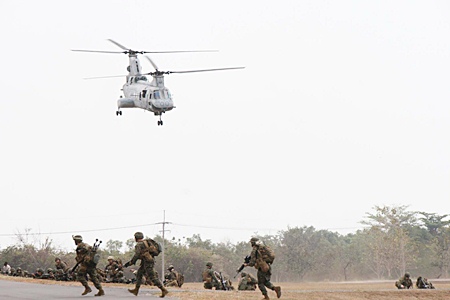 Thai and American helicopters lead a mock amphibious assault with South Korean marines Feb. 13 at Prince Jetsada Camp in Sattahip.
Thai and American helicopters lead a mock amphibious assault with South Korean marines Feb. 13 at Prince Jetsada Camp in Sattahip.
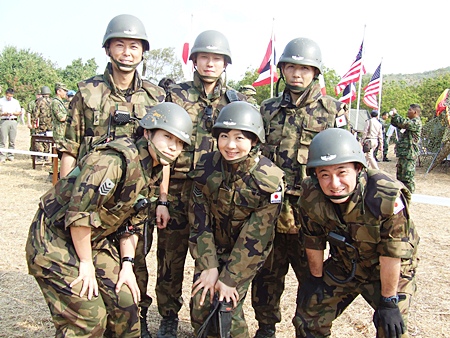 Japanese forces take time out for a commemorative photo during the Feb 12 evacuation drill.
Japanese forces take time out for a commemorative photo during the Feb 12 evacuation drill.
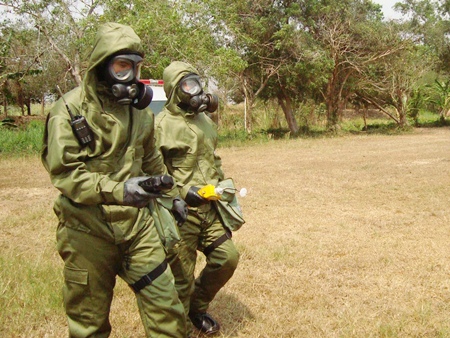 Troops re-enact the process of locating nuclear and biochemical substances in a battle situation.
Troops re-enact the process of locating nuclear and biochemical substances in a battle situation.
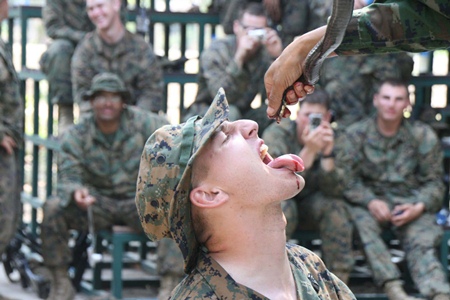 Troops drink cobra blood as part of their wilderness training.
Troops drink cobra blood as part of their wilderness training.
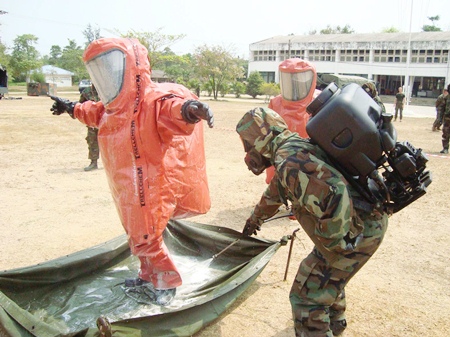 After finding and disposing of the chemical weapons, soldiers are disinfected to ensure no after effects.
After finding and disposing of the chemical weapons, soldiers are disinfected to ensure no after effects.




